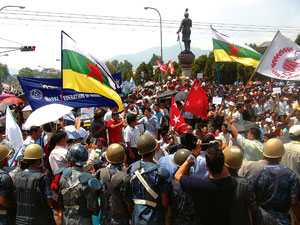 DANDA GURUNG |
BBC: What are the reasons behind starting an ethnic (janajati) political party?
Krishna Bhattachan:
Your question is biased to begin with. We are forming a national party that will unite the voices of the Dalits and Janajatis and end 240 years of internal colonisation and marginalisation of the backward communities. Unlike the bigger parties, our new party will not be run by people belonging to a particular gender, class or caste.
Kripasur Sherpa: Instead of forging unity among Nepal's diverse ethnic groups, the ones trying to create a Janajati party are misguiding the public by selling caste and ethnicity. But politics functions on ideology and agendas, not on narrowly defined identities.
How differently would such a party address the demands of the Janajatis?
Bhattachan: The party will fight for social justice and work towards bringing marginalised communities into the national mainstream. We will also demand for a fully proportional representation system at all levels of the state machinery.
Are you talking of priority rights?
No, we are talking about an inclusive state as defined and advocated by the United Nations Declaration on the Rights of Indigenous Peoples.
Why is decision-making in all major political parties dominated exclusively by Brahmins and Chettris?
Sherpa: The leaders represent their parties and respective ideologies, not their caste groups. If the Janajati leaders have been unable to influence party decisions, it is their own fault. They have to be more assertive.
How will the new party address marginalisation within the Janajatis and Dalits?
Bhattachan: There are multiple levels of marginalisation within Nepali society out of which caste and gender based exclusion is the most severe. If we are to make the country more inclusive, we must first address the question of caste and gender and then other forms of oppression within them including class-based marginalisation.
There are already Madhes based parties which deal with regional issues, so what is the harm in having an ethnic party which works on behalf of ethnic groups?
Sherpa: The problem is not the party or its agendas, but the approach. Identity is an issue that must be debated and addressed but it should not jeopardise the social harmony that exists between different communities in Nepal. Besides, a party that has no ideology and philosophy and focuses only on caste issues cannot last long in politics.
Bhattachan: It is wrong to assume that a Janajati party cannot have an ideology or philosophy. The party's main objective should be to provide a voice for marginalised communities while following the principles of socialism, human rights and inclusion.


